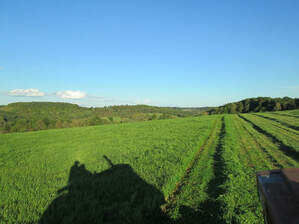CONSERVATION CORNER
A weekly blog for all things conservation
 By: Miranda Neville, Agricultural Resource Specialist, BCCD In a fast-paced world that demands constant change with bigger-is-better ideals, many still look at small, conventional, dairy farming as an antiquated way of life. Often referred to as “stubborn farmers”, a term I’ve uttered myself more often than I care to admit…sorry husband, the advancement of farming practices has proven just the opposite. Ironically, if you were to sit down with those “stubborn farmers” you could learn so much about the growth of the industry and how they’ve had to evaluate, adapt, and adjust to so many new pressures. The origin of the family farm was to provide a stable life for a family while supplying surrounding communities with farm fresh milk and locally grown produce. A simpler time. As communities got bigger, so did the demand on the farmer. Not only the demands, but more astringent regulatory requirements and increased skepticism from the general public. Though farmers are getting paid significantly less for their products, operating costs are at an all-time high and many cannot sustain. Dairy farmers are given two options: change to meet demands or sell the farm, the foundation of their family. For decades, many farmers did things “the way grandpa did it”. Field tillage was seen as the best practice to grow excellent crops- turns out that’s not true (hello, Dust Bowl). Over the last 100 years farmers and partnering agencies have been working to find better methods such as no-till planting or reduced/minimum tillage; progressing from horses and plows to GPS operated tractors and implements. Farmers are generating less soil disturbance and utilizing less acreage while still striving to maximize yields to feed the nation. The very nation that is becoming so far removed from the realities of farming, that now farmers are not only stewards of the land but also have had to become educators of the masses, fluent in social media exposure.
Though we have many of the same principles as when family dairy farms originated, there are now so many new challenges that ‘grandpa’ didn’t have to face. The ever-evolving farmer, striving to take the best care of their cattle and their land are now being targeted by animal rights activists and public scrutiny of the dairy industry. What the general public fails to realize is that farmers are in the animal welfare business and only want the best for their cattle. If farmers don’t take great care and pride in their livestock, animal health declines, and in turn, so does the farm income. Dairy farmers have gone from hand milking into a pail, to milk dumping stations, to portable units and pipelines, to robotic milking systems with the goal to boost milk quality and streamline farm efficiency. From structural changes like modifying barn designs to management changes like switching bedding material, adjusting feed rations, or selecting a new genetics program - can make or break a farm. Each upgrade is made with the goal of increasing cattle comfort, overall wellness, quantity and quality of milk products. All management changes are done to comply with strict regulations, economic challenges and shifting consumer preferences; and so, the dairy farmer is forced to grow more, learn more. If people really want to know where their food comes from, more people should be willing to go to the source. Ask a farmer. Be educated on the process. The REAL process, not just what social media wants you to see. Dairy farmers take pride in how much hard work and dedication goes into those products. They make it their job to grow, evolve and make positive impacts on the world. That “stubborn farmer” is actively working to save every acre of soil, raising healthy, happy livestock and is making great strides in securing a positive future for us all. The Bradford County Conservation District is committed to helping people manage resources wisely. You can visit the Bradford County Conservation District at 200 Lake Rd in Wysox across from the Wysox Fire Hall. Contact us at (570) 485-3144 or visit our web page at www.bccdpa.com.
2 Comments
1/31/2021 04:55:41 pm
Wow! Excellent. When I'm reading the whole content I feel so smart. Very informative article that helps me a lot. I will share this to my friends and classmates. Wait. Just sharing this website (www.horses-haarlem-oil.com), I read also about the benefits of their products. By the way, I am so happy to read your content here. I will share this link/website of you to my fellows. Thank you and God bless! Have a great day, ahead!
Reply
Leave a Reply. |
AuthorsVarious staff at the Bradford County Conservation District Archives
April 2024
Categories
All
|
